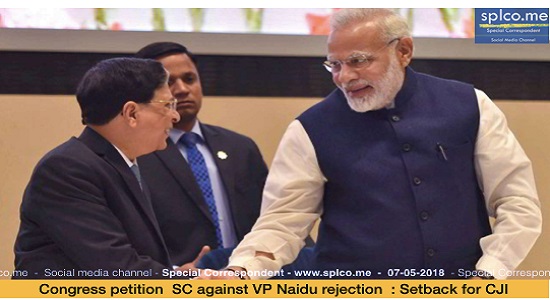Two Congress Rajya Sabha Members of Parliament on Monday moved the Supreme Court challenging vice president Venkaiah Naidu’s rejection of an opposition motion seeking the removal of the Chief Justice of India, Dipak Misra, on grounds of ‘misbehaviour’.

The petitioners, Pratap Singh Bajwa and Amee Yagnik, in their plea argued that once a removal motion signed by MPs is submitted to the Rajya Sabha chairman, he has no option but to constitute an inquiry committee to look into the charges.
The Congress and six other opposition parties last month moved a notice for the removal of the Chief Justice Dipak Misra on five grounds of “misbehaviour”, the first time in the history of India. However, Naidu rejected the notice on the grounds that the allegations lacked merit.
On April 23, senior Congress leader Kapil Sibal had termed Naidu’s order as “unprecedented, illegal, ill-advised and hasty” and asserted that the party will challenge it in the Supreme Court.
He had also hoped that the Chief Justice would have “nothing to do” with the petition when it would come up for listing in the court. As the master of the roster, it is the chief justice who assigns cases.
The rejection of the notice had a precedent nearly five decades ago when a Supreme Court judge faced such a bid for the first time.
An impeachment motion against Justice JC Shah was submitted to Lok Sabha speaker GS Dhillon in May 1970 following a campaign by a former government servant, OP Gupta, charging Shah with dishonesty after the judge made certain remarks about him during a hearing. The notice was, however, turned down by the Speaker after stating it as “frivolous”.
However this time motion moved by Law makers that is causing worries for CJI deepak misra.
Besides rejection of such notice against CJI Misra and Justice Shah at the preliminary stage, there was another such case when 58 Rajya Sabha MPs had moved a petition before the Chairman and former Vice-President Hamid Ansari against Gujarat High Court judge Justice J B Pardiwala in 2015 for his alleged “unconstitutional” remarks against reservation.
Facing the possibility of an impeachment motion against him, Justice Pardiwala expunged the remarks he had made against reservation in the Hardik Patel case order on an application by the state government seeking removal of the controversial portion.
Later, no effort was made to take forward the notice of impeachment against Pardiwala.














